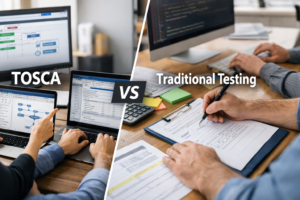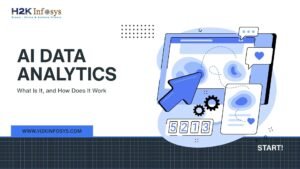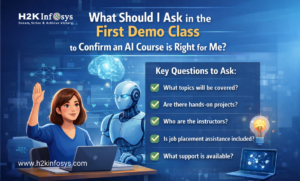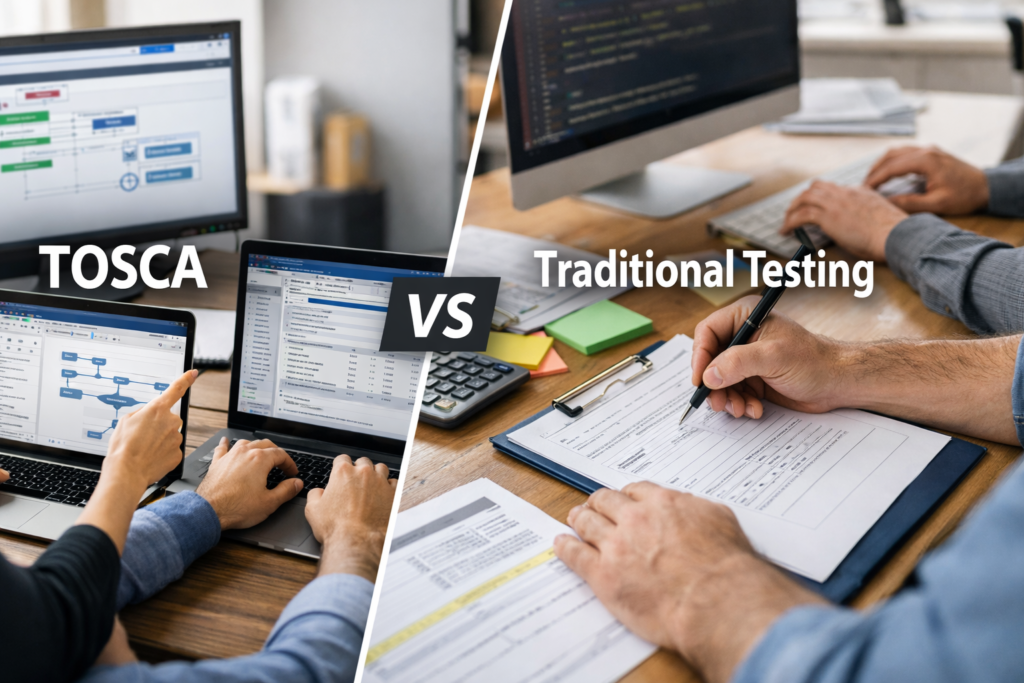Introduction
As artificial intelligence (AI) reshapes industries at lightning speed, business analysis is no longer what it used to be. Traditional tools, methods, and mindsets are evolving in the face of AI’s data-centric, automated, and predictive capabilities. Business Analysts (BAs) must now adapt to a future where AI plays a critical role in how organizations gather insights, make decisions, and optimize processes. To stay competitive, many professionals are turning to Business Analyst Classes Online to upskill, understand AI integration, and prepare for this new data-driven landscape.
But does this mean the role of the Business Analyst is fading? On the contrary. The future of business analysis in an AI-driven world is more relevant, strategic, and transformative than ever before. This blog explores how AI is reshaping the field, what new skills BAs need to thrive, and how the profession is evolving to meet the demands of tomorrow’s digital-first enterprises.
The Current Landscape of Business Analysis
Business Analysts are the bridge between business needs and technological solutions. They gather requirements, map workflows, identify inefficiencies, and guide project teams toward meeting strategic goals. In today’s digital ecosystem, their responsibilities have expanded to include data interpretation, automation assessment, and digital transformation planning.
Traditionally, BAs have worked with stakeholders to understand pain points and translate them into actionable solutions. But with AI entering the scene, new questions arise:
- How do we use machine learning (ML) to improve forecasting?
- What data should we prioritize for predictive analytics?
- How can chatbots and intelligent automation enhance customer service?
These are no longer questions for data scientists alone. Business Analysts must now guide AI adoption strategically, aligning technology with business value.
How AI Is Impacting Business Analysis Today
AI is not just a buzzword it’s a game-changer. From automating routine tasks to generating data-driven insights, AI is transforming how business analysis is done. Here’s how:
Automated Requirement Gathering
Automated Requirement Gathering is revolutionizing the way Business Analysts collect, organize, and manage project requirements. Instead of manually documenting stakeholder needs through endless interviews and meetings, automation tools now streamline the process using AI, natural language processing, and integration with communication platforms. These tools can extract relevant requirements from emails, chat logs, and voice transcripts, reducing human error and saving time. Automated systems also help in real-time tracking, prioritization, and version control of requirements. By enhancing accuracy and speed, automated requirement gathering allows Business Analysts to focus more on analysis, strategy, and delivering value to stakeholders effectively.
Predictive Analytics
Predictive Analytics empowers Business Analysts to make data-driven decisions by leveraging historical data, statistical algorithms, and machine learning techniques. Instead of relying solely on past trends or intuition, predictive analytics forecasts future outcomes such as customer behavior, market shifts, or operational risks. Business Analysts use these insights to recommend proactive strategies, optimize processes, and improve business performance. Tools like regression models, decision trees, and neural networks are commonly used to identify patterns and predict potential scenarios. By integrating predictive analytics into their workflow, analysts can support smarter planning, reduce uncertainty, and drive more informed and strategic business decisions.
Enhanced Decision-Making
Enhanced Decision-Making is a crucial benefit of modern Business Analysis, especially when supported by data analytics and intelligent tools. With access to real-time data, dashboards, and automated reporting systems, Business Analysts can provide deeper insights into business performance and trends. This empowers stakeholders to make informed decisions quickly and confidently. Enhanced decision-making involves combining structured data analysis with business context to identify opportunities, mitigate risks, and prioritize actions effectively. It also promotes collaboration by presenting clear, visual data interpretations. Ultimately, this leads to better outcomes, improved efficiency, and a competitive advantage in fast-paced business environments.
Robotic Process Automation (RPA)
Robotic Process Automation (RPA) is transforming business operations by automating repetitive, rule-based tasks that traditionally require human effort. Business Analysts play a key role in identifying processes suitable for RPA, such as data entry, invoice processing, or report generation. By implementing RPA tools, organizations can reduce errors, improve efficiency, and cut operational costs. These software robots work around the clock, ensuring faster execution and consistent quality. RPA also frees up human resources to focus on higher-value, strategic tasks. For Business Analysts, understanding RPA enables better process design, optimization, and delivery of solutions that align with business goals and digital transformation.
The Evolving Role of the Business Analyst in an AI World
In the AI era, the role of the Business Analyst is shifting from operational to strategic. Here’s how the job description is evolving:
From Data Collector to Insight Curator
From Data Collector to Insight Curator reflects the evolving role of Business Analysts in the age of digital transformation. Traditionally tasked with gathering and documenting data, today’s analysts are expected to interpret and synthesize that data into actionable insights. Rather than simply compiling information, they now analyze trends, uncover patterns, and translate complex data into strategic business decisions. This shift requires strong analytical skills, business acumen, and proficiency in data visualization tools. By curating insights instead of just collecting data, Business Analysts add greater value, guiding organizations toward innovation, efficiency, and competitive advantage in an increasingly data-driven world.
From Functional Expert to AI Enabler
From Functional Expert to AI Enabler signifies the transformation of Business Analysts from traditional role-holders to key players in AI-driven initiatives. While they once focused mainly on understanding business processes and functional requirements, today’s analysts must bridge the gap between business needs and intelligent technologies. As AI Enablers, they identify opportunities where AI can automate tasks, enhance decision-making, or personalize customer experiences. They collaborate with data scientists and engineers to ensure AI solutions align with business objectives. This shift demands new skills in AI concepts, data literacy, and change management, positioning Business Analysts as strategic partners in digital innovation and enterprise growth.

From Project Coordinator to Change Leader
From Project Coordinator to Change Leader captures the growing strategic influence of Business Analysts in modern organizations. Traditionally, BAs acted as facilitators who managed requirements and coordinated between teams. Today, they are expected to lead change by driving innovation, influencing stakeholders, and ensuring successful adoption of new systems or processes. As Change Leaders, Business Analysts play a vital role in shaping organizational transformation, aligning business goals with technological advancements, and managing resistance to change. This evolution requires strong leadership, communication, and problem-solving skills. By embracing this role, BAs become catalysts for growth, guiding businesses through complex transitions with clarity and confidence.
Critical Skills Business Analysts Need in an AI-Driven Future
To stay relevant, Business Analysts must upskill. The future belongs to those who can blend business acumen with tech fluency. Here are the essential skills:
Data Literacy
Data Literacy is a critical skill for Business Analysts in today’s data-driven world. It refers to the ability to read, understand, interpret, and communicate data effectively. Business Analysts with strong data literacy can identify meaningful patterns, ask the right questions, and draw actionable insights from various data sources. This skill is essential for making informed decisions, supporting strategic planning, and collaborating with data teams. Data literacy also involves understanding data quality, context, and limitations. As organizations increasingly rely on data for competitive advantage, Business Analysts must be proficient in data visualization, storytelling, and tools like Excel, SQL, or BI platforms.
AI and Machine Learning Concepts
AI and Machine Learning Concepts are essential knowledge areas for modern Business Analysts aiming to stay relevant in a technology-driven landscape. Understanding these concepts allows BAs to identify opportunities where AI can automate processes, enhance decision-making, or improve customer experiences. Key topics include supervised and unsupervised learning, natural language processing, predictive modeling, and recommendation systems. Business Analysts don’t need to build algorithms but must understand how they work, what data they require, and how to interpret results. This enables effective collaboration with data scientists and ensures AI solutions align with business objectives, adding greater value to digital transformation initiatives.
Business Intelligence (BI)
Business Intelligence (BI) enables Business Analysts to transform raw data into actionable insights using tools like Power BI, Tableau, or Qlik. BI supports data visualization, reporting, and trend analysis, helping organizations make informed decisions. Mastering BI tools enhances a Business Analyst’s ability to drive strategic value through data.
Agile and DevOps Knowledge
Agile and DevOps Knowledge equips Business Analysts to thrive in fast-paced, iterative development environments. Understanding Agile principles and DevOps practices enables effective collaboration with cross-functional teams, faster requirement delivery, and continuous improvement. This knowledge helps BAs align business goals with technical
Soft Skills: Critical Thinking and Communication
Soft Skills: Critical Thinking and Communication are vital for Business Analysts to analyze complex problems, evaluate solutions, and articulate insights clearly. Critical thinking supports informed decision-making, while strong communication ensures alignment among stakeholders. Together, these skills foster collaboration, drive clarity in requirements, and contribute to successful project outcomes.
Use Cases: Business Analysis in Action with AI
Let’s explore real-world examples of how AI is changing business analysis:
Healthcare
In healthcare, BAs are using AI tools to predict patient readmissions, optimize appointment scheduling, and automate claims processing. They analyze patterns to recommend AI models for early diagnosis or treatment personalization.
E-Commerce
BAs in e-commerce use AI-driven customer segmentation and recommendation systems. They translate data into customer experience strategies, suggest A/B testing, and support chatbot implementation.
Finance
From fraud detection to credit scoring, AI is transforming finance. BAs help define the scope of AI-based risk models, evaluate data quality, and ensure compliance with regulations.
Manufacturing
Manufacturing is undergoing a digital transformation, with Business Analysts playing a key role in optimizing operations through data-driven insights. In this sector, BAs help identify inefficiencies, streamline production workflows, and support predictive maintenance by analyzing equipment performance data.
AI Tools Every Business Analyst Should Know
While not all BAs will become data scientists, knowing these tools helps bridge the gap:
- ChatGPT / Copilot – For quick documentation, stakeholder communication drafts, or gathering idea prompts.
- Tableau + Einstein Analytics – Visualize patterns and integrate AI insights.
- Microsoft Power BI (with AI) – Leverage machine learning-driven dashboards.
- Alteryx / KNIME – Data prep and analytics automation tools.
- Lucidchart / Miro – Collaborate and visually represent complex AI workflows.
Challenges Business Analysts Face in the AI Era
The shift toward AI comes with its own set of challenges:
Data Quality and Governance
Data Quality and Governance are essential for Business Analysts to ensure accurate, reliable, and compliant data usage. Strong governance practices help maintain data integrity, consistency, and security across systems. Understanding these concepts enables analysts to make trustworthy recommendations and support regulatory compliance in data-driven decision-making environments.
Black Box Models
Black Box Models refer to complex AI or machine learning algorithms whose internal logic is not easily interpretable. Business Analysts must understand the implications of using such models, especially regarding transparency, trust, and accountability. Recognizing their limitations helps analysts advocate for explainable AI and make informed, ethical recommendations.
Organizational Resistance
Organizational Resistance is a common challenge during change initiatives, including digital transformation. Business Analysts must identify root causes such as fear, lack of understanding, or cultural inertia and address them through clear communication, stakeholder engagement, and training. Overcoming resistance is key to successful project adoption and long-term organizational growth.
Ethical and Regulatory Compliance
Ethical and Regulatory Compliance is a crucial responsibility for Business Analysts in today’s data-driven environment. As organizations increasingly rely on AI and analytics, BAs must ensure that data usage aligns with ethical standards and complies with regulations like GDPR, HIPAA, or CCPA. This includes safeguarding privacy, ensuring transparency, and avoiding algorithmic bias. Business Analysts must work closely with legal and compliance teams to embed these principles into project requirements, fostering trust and accountability while minimizing legal and reputational risks for the organization.
The Future Outlook: What’s Next for Business Analysis
Looking ahead, the business analysis profession is poised to grow not shrink in value. AI won’t replace Business Analysts. Instead, it will amplify their impact. Future trends include:
- Hyperautomation: Combining AI, RPA, and low-code platforms to fully automate business processes.
- BA + Data Scientist Collaboration: Joint efforts to design, monitor, and refine AI models.
- Digital Twins: Simulating business scenarios using AI requiring BAs to interpret virtual models for real-world action.
- AI-Driven Strategy: BAs aligning corporate strategy with data intelligence to drive competitive advantage.
How to Prepare for the Future: Steps to Take Now
Ready to future-proof your career in business analysis? Here’s how to begin:
Enroll in AI-Focused Business Analyst Courses
Look for Business Analysis Online Training programs that blend traditional BA skills with data analytics and AI awareness.
Learn Data and BI Tools
Start with Excel, then move to SQL and visualization platforms like Tableau or Power BI. Even basic Python or R exposure helps.
Practice on Real-World Projects
Volunteer for AI or RPA pilot projects in your current organization or work on case studies to gain experience.
Stay Updated
Follow industry blogs, attend webinars, and join BA and AI communities to stay informed.

Get Certified
Certifications like CBAP, ECBA (from IIBA), or AI Business Strategist credentials show employers you’re ready for the next wave of innovation.
Conclusion:
AI is not the end of business analysis it’s a new beginning. As businesses navigate complexity, automation, and disruption, they need skilled professionals who can connect the dots between data, technology, and strategy.
Business Analysts are uniquely positioned to drive AI adoption and ensure it serves real business goals not just technical curiosity. Through Business Analyst Training & Placement, they gain the necessary skills to understand AI’s potential, apply it effectively, and lead cross-functional initiatives. By embracing AI, expanding their skill sets, and championing ethical, data-driven decisions, today’s Business Analysts can evolve into tomorrow’s digital transformation leaders
- The role of Business Analysts is becoming more strategic in the age of AI.
- Skills like data literacy, AI familiarity, and strong communication are essential.
- Real-world applications of AI in BA include healthcare, finance, and e-commerce.
- Challenges include data governance, ethical concerns, and organizational resistance.
- The future of business analysis lies in collaboration, innovation, and continuous learning.


























